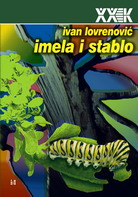
Lovrenović, Ivan – Mistletow and the Tree Trunk. Esays and Chronicles
2011, p. 352
Price $10
Cover design: Ivan Mesner
Ivan Lovrenović (b. in Zagreb in 1943) a prose writer, essayist, and a journalist, grew up in Mrkonjić Grad, and received secondary and higher liberal arts education in Zagreb (Yugoslav literatures, languages, and ethnology). Upon his return to Sarajevo, he became editor-in-chief of the literary and cultural review Odjek (Echo) and editor in the publishing companies Veselin Masleša and Svjetlost. After an escape, with his family, from Grbavica, a Serb-occupied section of Sarajevo, he spent five years in exile in Zagreb, Croatia and in Berlin, Germany. After Grbavica was reintegrated, he returned to Sarajevo. He has published the novels, The Journey of Ivan Frane Jukić (Putovanje Ivana Frane Jukića, 1977), and Liber Memorabilium (Liber memorabilium), essays in cultural studies, An Inner Country, A Brief Outline of of the Cultural History of Bosnia and Herzegovina (Unutarnja zemlja, kratki pregled kulturne povijesti Bosne i Hercegovine, 1998), and The Bosnian Croats, An Essay on the Agony of a Euro-Mid-Eastern Culture (Bosanski Hrvati, esej o agoniji jedne evropsko-orijentalne kulture, 2003), travel journal Seven Days Across Bosnia in August of 2008 (Sedam dana po Bosni u kolovozu godine 2008., 2009), as well as a number of volumes of political essays and chronicles. He won the ”Midhat Begić” award of the Bosnia and Herzegovina PEN Club for his essay, entitled Ivo Andrić and the Paradox of Silence (Ivo Andrić i paradoks šutnje). His book The Inner Country has been translated into German, Czech, Hungarian, and English.
FOREWORD
The first decade of the Twenty-first Century was the period during which were written the texts included in the present volume.[1] They bear a visible and an intentional mark of the everyday and of my involvement in it. The horizon line of this beginning-of the-century Bosnian post-Yugoslav everyday is low, narrow, and murky. It is as if Bosnia, this horrific victim of the disintegration of Yugoslavia, of the principal agents of that disintegration, and of its own internal demons, were back in its pre-emancipation state, mired down in an obscure armlet of History, unable to navigate its way into its fairway, into the World. It has become a non-place to the point of requiring a lot of strength and empathy from anyone to love it and sympathize with its tragedy, for sympathy and tragedy have politically been milked dry, and turned into a grotesque caricature.
Recognizing this world, this land of “frowning beauty”(Andrić), for his very own, this author hopes the readers will recognize his effort to reach beyond its low and murky horizon line, to explore or at least intimate better possibilities in it.
In this kind of quest, which is a covenant and a passion, skeptical and melancholy though it is, no shock-absorbing mechanisms of any kind can be useful. The face of reality is not going to become any less gargoyle-like, just because we have turned ours away from it. The true attachment to one’s own world has only one trustworthy aspect: critical thinking, lucid rejection of illusions, of self-deception, cheap comfort, and empty hope. Krleža availed himself of enough freedom to go to the very bottom of this issue: ”Negation is my familiar way of accepting the world”. NB: accepting!
Mental Pigmies, illusionists of all stripe, professional optimists, and above all dogmatic patriots, lovers of the State, troubadours of the Nation can find in so defined an attachment all too many reasons for suspicion, anathema, and exclusion. Hence, all those clashes, confrontations, write-ups and their rebuttals. There was a proliferation of them during the last decade: included here are only those most indicative. Not in the least gentle, and seldom conciliatory, they too are a sign of the times and a form of belonging, as well as an indication of a longing for the possibility of a different kind of communication: the kind in which sharp disagreement would not call for mutual annihilation, but would produce the intellectual joy of opposing views being reflected in each other. Even if we can hope for nothing of the sort, nothing short of that is more worth striving for. I. L.
________________________________________________________________________
1 Most have been published in newspapers and periodicals to which I have been contributing texts to date. They are, among others, the Split newspaper Feral Tribune, until it its extinction in 2008; the Sarajevo based news magazine Dani, until its original, true, version became defunct in 2010; the Sarajevo Franciscan review Svjetlo riječi (Light of the words), a unique example of religious press in view of its openness to this world and its self-refexiveness; Eifel Bridge (Ajfelov most), a literary magazine on Miljenko Jergović’s web-page (www.jergovic.com), which has preserved the name and the spirit of the short-lived Bosnian-American paper back edition, attractively conceived of and realized by Semezdin Mehmedinović and Miljenko Jergović.



